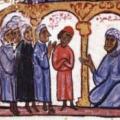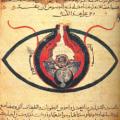131 - Deborah Black on al-Fārābī's Epistemology
Posted on
Deborah Black joins Peter to talk about al-Farabi's innovations concerning knowledge and certainty.
Themes:
Further Reading
• D.L. Black, Logic and Aristotle’s “Rhetoric” and “Poetics” in Medieval Arabic Philosophy (Leiden: 1990).
• D.L. Black, “Al-Fārābī,” A Companion to Philosophy in the Middle Ages, ed. J. Gracia and T. Noone (Malden, MA: 2003), 109–117.
• D.L. Black, “Knowledge (ʿilm) and Certitude (yaqīn) in al-Fārābī’s Epistemology,” Arabic Sciences and Philosophy 16 (2006), 11-46.
• D.L. Black, “Al-Fārābī on Meno’s Paradox,” in P. Adamson (ed.), In the Age of al-Fārābī: Arabic Philosophy in the Fourth/Tenth Century (London: 2008), 15-34.







Comments
Agent Intellect
That is a very fine discussion with Deborah, Peter. But I will have to write to her or Skype her for a few more minutes discussion of the Agent Intellect in al-Farabi. I know she inclines to seeing it as a final cause rather than efficient but she did not state it that way in the podcast. At any rate, I am not quite certain how she sees the AI to function in cognition and in the constitution of the world. In particular I am not clear on how prophecy works if the AI is primarily or solely a final cause. I could, of course, construct an account of how it draws the prophet to actuality through finality but I don't see that in al-Farabi.
But, as you know, I regard Averroes not only as trying to be a pure Aristotelian in the 12th c. but also as one who takes the principles and leanings of al-Farabi to the bitter end, and the bitter end is the collapse of Classical Rationalism with Averroes. What am I talking about? Well, in his (mature or perhaps nearly all) philosophical writings there is no afterlife for Averroes, there is no particular providence, there is no de novo creation, there is no theory of prophecy (and so there is no philosophical account of scripture as a divine donation [unless one gives a contorted account through final causality]), and — following al-Farabi — the purest truth is philosophical, even to the point of Averroes saying that the most perfect form of worship is to study God and God's 'creation' in the science of metaphysics (the shari‘a of the philosophers). The collapse I will explain another time but you see where I am going.
But I am off for another morning walk and I will listen to you and Deborah one more time attentive to the issue of the AI in al-Farabi.
Thanks for these fine discussions. I will be requiring them for my undergrads in Ancient Philosophy in Spring 2014 and for grad students in my Fall 2013 Aquinas course with MU and KUL. I wonder when you will reach Aquinas. Probably not this year, I suppose. But keep up the good work. For me it makes for entertaining and clarifying walks.
Richard
Other philosophers adopt the idea that prophet must align with r
Peter,
Sorry again to return to much earlier episodes. I am looking for any other philosophers who may have made similar claims to those discussed in this episode by Farabi. As I understood this part of the discussion, Prof. Black maintained that Farabi asserted that though the Prophet may get knowledge at once, and "without doing all the work", that it still had to align with what knowledge could be obtained through the methods and requirements discussed. Were other philosophers holding that or discussing it?
In reply to Other philosophers adopt the idea that prophet must align with r by Dave Lavery
Prophecy
Yes indeed, in fact there is a passage in al-Kindi (in "On the Quantity of Aristotle's Books") where he says this, almost verbatim. Other "naturalistic" or "rationalistic" accounts of prophecy were put forward by other philosophers, for instance Ibn Sina (Avicenna). It is something of a hallmark of Greek-influenced philosophy (falsafa) in the Islamic world.
Oh and don't hesitate to comment on old episodes, that's what the comment function is for!
Add new comment